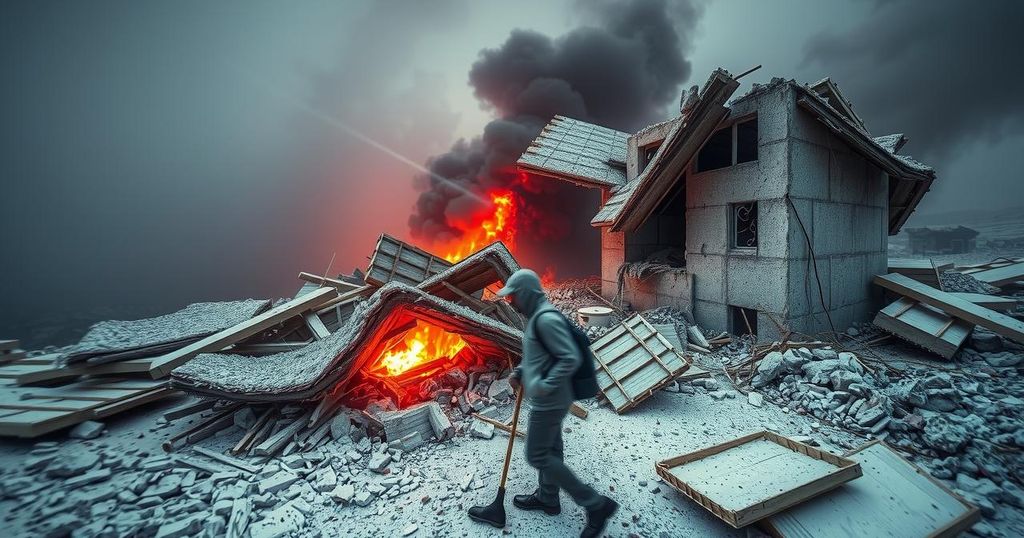The Sunni Awakening in Lebanon: Political Shifts and Implications for Stability

The article explores the awakening of the Sunni community in Lebanon in the wake of the Assad regime’s collapse in Syria, highlighting demands for amnesty for Sunni prisoners. It discusses Hezbollah’s weakening influence amid a divided political landscape and the implications for Lebanon’s stability as Sunni activists seek renewed power. The article also touches on the cautious approach of the new Syrian regime regarding Lebanese affairs and the potential risks associated with rising Sunni sentiment.
The recent political dynamics in Lebanon highlight a burgeoning awakening within its Sunni community, especially following the Assad regime’s decline in Syria, which has revitalized Sunni interests against Hezbollah. Following jubilation over regime change, Sunni Islamists, particularly from Jamaah Islamiya, demanded the release of long-imprisoned Sunni prisoners. Sheikh Ahmad Shemali led protests advocating for amnesty, signaling a shift towards a more assertive Sunni political landscape in Lebanon, amid an unstable power structure characterized by Hezbollah’s declining influence.
The attention toward Sunni restoration is further fueled by the rise of the jihadist group Tahrir al Sham (HTS) in Syria, leading to aspirations for renewed Sunni hegemony in Lebanon. However, Sunni demands for amnesty face significant obstacles, particularly as political decisions rest with Speaker Nabih Berri, an ally of Hezbollah, who is unlikely to initiate any changes that could weaken his coalition’s grip.
Lebanon’s political system is in disarray as Hezbollah struggles to maintain its grip following substantial military losses to Israel and shifts in public support. The Lebanese Armed Forces’ commander, Gen. Joseph Aoun, held discussions with Hezbollah leader Wafiq Safa over their military arrangement, with pressure mounting for the army to assert control south of the Litani River. The fragile equilibrium in Lebanon is further compounded by a divided Christian community actively searching for a consensus candidate ahead of the presidential elections in January 2025.
The Sunni revival amid these developments presents potential risks for Lebanon, particularly as they could spark increased instability and irredentist movements. Historical memories of ISIS’s incursion highlight the persistent fears regarding the potential for spillover of unrest from Syria. Ahmad al Sharaa, a leader in Syria’s opposition, signaled support for Gen. Aoun while assuring no intention of interfering in Lebanon, portraying relative caution from the new Syrian regime amidst its consolidation phase. Thus, Lebanon’s fate remains intertwined with the evolving situation in Syria, and while the Sunni resurgence poses risks, the current Syrian regime seems disinterested in fostering instability in Lebanon for the foreseeable future.
The article delineates the multifaceted political crisis in Lebanon arising from the shift in power dynamics associated with the Assad regime’s decline in Syria. It explores how the Sunni community, previously politically dormant, is now mobilizing for greater influence and retribution concerning Sunni prisoners. Additionally, it contextualizes Hezbollah’s weakened position and highlights the interplay between various political factions navigating through an intricate landscape of loyalties and historical grievances. This backdrop enables a better understanding of the Sunni awakening, the implications for Lebanese politics, and the cautious stance of the new Syrian regime.
In summary, the evolving situation in Lebanon, marked by a resurgence of Sunni activism amid the backdrop of Syrian political shifts, signals a critical juncture in the nation’s political landscape. The Sunni community is seeking greater prominence as Hezbollah grapples with declining power, setting the stage for potential unrest as the political scenario intensifies. Although Sunni aspirations may strain Lebanon’s fragile stability, the new Syrian regime’s current focus on domestic consolidation suggests limited immediate external threats to Lebanese sovereignty. Future developments will be closely tied to unfolding events in Syria which could redefine Lebanon’s socio-political fabric.
Original Source: aurora-israel.co.il





